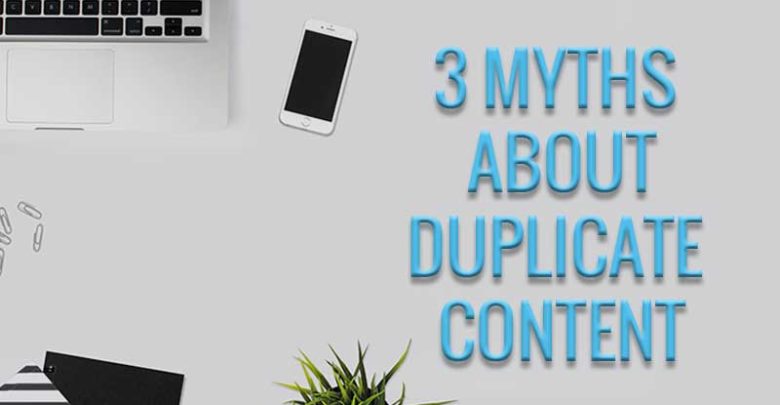You are running a website and worried about the words like “duplicate content penalty” and “duplicate content myths.” Yes, Everyone is. Most people assume that if anything appears twice online, Google will penalize their website because of duplicate content myths. Somehow, they have never read Google guidelines on myths about duplicate content.
Some of them shave their myths about duplicate content. To understand these myths you have to look a bit more at the realities of duplicate content myths in the world.
Here are some duplicate content myths that will help you against the duplicate content problems:
Myth#1: Non-Original Content Will Decrease Your Rankings
I have seen so many blog posts talking about duplicate content penalties. Guess what… These Duplicate Content Myths doesn’t exist.
There are these two ways to lose Google rankings:
Google Algorithmic Update Penalty Hit: These are usually followed by a message notifying you of the loss of your site rankings for some reason in your Google Search Console.
Manual Penalty Hit: Google representatives always confirm these. Google is now a part of the algorithm they said that they would not approve some of the future updates. But as always they were being spotted by some of the website owners like @dr_pete and @rustybrick.
When something seems to go wrong with many people’s rankings. If you check yours too, it will be beneficial for your website rankings.
None of the Google representatives have confirmed the “duplicate content penalty” until now, from what I know.
Duplicate content can only harm your site if Google becomes confused about which of the non-original pages or posts they need to rank. In this way, Google can rank the page accidentally, that you didn’t intend them to.
It is a very common problem for the websites running WordPress, where category and tag pages have most of the content from your posts, they can outrank your blog posts. An effortless way to solve that problem is to use some tools like SE Ranking which will show the existing problems in your blog.

You can use an SEO tool like Yoast SEO (or other alternative SEO plugins) to block the pages you don’t want to rank. In this way, Google will index the page that you want, and it won’t mess with your rankings.

This will keep Google from including tag pages into their search results, but Google crawlers will still be able to crawl those there.
Here’s a complete explanation: Google can rank only one instance of original content from your site to their search results. They don’t want their visitors to click on the same content again and again. So, they can choose only one instance to rank to their search results.
But it’s not a penalty (Google will not punish your page for this). Google is very good at picking the sites that are relevant. In an interview with Matt Cutts said there is more than 25% of web content that is duplicated.
So, you don’t want Google to get puzzled. For this, you will have to make a more precise map for Google to show that what’s more important on your site.
Also Read: How to Start a Blog that can Generate Thousands Of Dollars
Myth #2: Scrapers Will Kill Your Site Rankings
Google knows how to handle the duplicate content problem very well. You don’t have to worry about the posts that have been picked up by scrapers. Google can handle that too.
Big blogs are scraped ten times before breakfast. Do you think they have a team watching GWT and disavow link all the day? No. They don’t worry about scrapers. So, they don’t fear about duplicate content myths.
[su_note note_color=”#1289FB” text_color=”#ffffff”]Tip#1: Always Report Scrapers that Outrank Your Site[/su_note]
It doesn’t mean you should not be using the Google duplicate content checker tools to spot your targets. These tools are an easy way to do that.
If in case of Google does get confused and outrank the wrong page of your content is outranking your original content in Google. You will have to tell Google about it. You can tell them using the Scraper Report Tool.
[su_note note_color=”#1289FB” text_color=”#ffffff”]Tip#2: Use Google Authorship to Digitally Sign Your Content[/su_note]
Google Authorship is not just getting your picture to appear in search results. It’s a way of associating you as the author by signing your name to a piece of content.
With Google Authorship, every piece of content is connected to one author and other contributors to blogs.
[su_note note_color=”#1289FB” text_color=”#ffffff”]Tip#3: Do Take Harsh Actions against Plagiarists[/su_note]
Scraped content and copyright infringement are two different things. Sometimes, a company will copy all of your content or site or keywords and claim the credit of creation.
Scrapers don’t plagiarize and take someone else’s work. Plagiarisers copies your content and claim that it is their original. It’s totally illegal, and the copyright symbol in your footer is for this work.
If it happens to you, you then think about lawyers, not the search engines. Here’s a true story of a complete website ripoff and step-by-step instructions on what actions to take.
[su_note note_color=”#1289FB” text_color=”#ffffff”]
Also Read: 12 Free Google Duplicate Content Checker Tools
[/su_note]
Myth #3 – You Can’t Re-Use Your Content Elsewhere
Now, read everything carefully. You can use the content you created wherever you want to use (provided you abide by policies of the website where you published it). But still, you don’t want to force Google to figure out the original content so that you don’t confuse Google.
You can handle these problems properly by the given scenarios:
1. Republishing your guest posts will hurt your site
Guest blogging is really important. But, all of your audience usually don’t see all of your guest posts. So, you want to republish these guest posts on your blog.
I prefer to use original content on my site strictly. But, it’s because I want to add value to my blog, not from the fear of duplicate content penalty.
[su_note note_color=”#1289FB” text_color=”#ffffff”]Tip: Use rel=“canonical” Tag

[/su_note]
You will have to check the official policies of the site where you published your content. If its okay to re-use your content, then you can go ahead and republish your content. But use the canonical tag to let Google know about the original content. You can also index it. It’s just another duplicate content myth that everybody thinks is real.
2. Syndicating your article to a more popular media outlet
Add the canonical tag hinting to the page on your site by picking an outlet. Social Media Today is a perfect example of such blogs. They let everyone publish non-original content by adding the URL as the source.
3. Republishing your guest articles to Medium or Linkedin
If the article you want to republish is from your own site, you’d better refrain from doing it. It’s because Linkedin and Medium will outrank your own site. Instead, you can use the outline of your article by converting your article into another format ( such as Create an Infographics, or you can design a digital brochure)
Some of the huge publication allows you to republish the full content elsewhere, and also add the “source” link at the beginning of your article. Entrepreneur is an example of this.
4. Translating your article and using it on a foreign media outlet
It’s also a prevalent duplicate content myth to translating and using the article will affect your site. Yes, you are safe to translate and republish the same content in multiple languages. But you will have to use official human language. Google flag the spammy content generated by automated translation.
Also Read: 101 Most Popular Google Keywords of 2018 and So Far
A Little More About Duplicate Content Myths
Googlebot visits so many sites every day. Treated. It finds duplicate content, and it knows where the original content appeared. Googlebot doesn’t penalize the sites. It moves on. That is what you need to understand and do.
Google is good at finding the duplicate content. Do you think it will penalize a blog because they saw a page of duplicate content?
Percentage of duplicate content is very huge across the internet and w Google knows this. They’ve been separating copies from originals since 1997. Long before the “duplicate content” became a buzzword in 2005.
Conclusion
If anyone of you, out there has actual examples or real evidence of penalties related to duplicate content myths, I’d love to hear them too.
So, don’t forget to share them and let me know that you liked the post and why by leaving a quick comment below!




